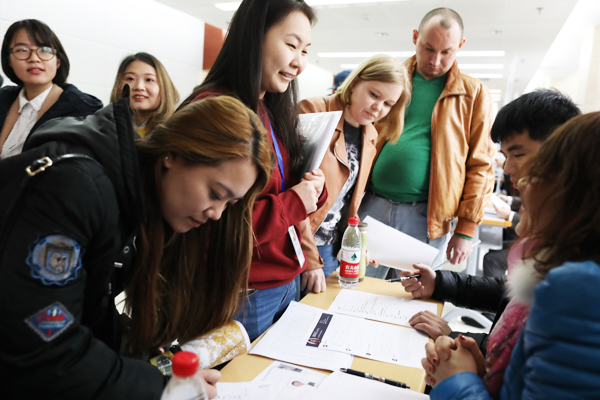 |
|
International students attend a job fair at Beijing's Zhongguancun high-tech zone on March 23. [Photo by Zhu Xingxin/China Daily] |
Four months before getting his master's degree in computer science, Irish student Gareth Lacey got a job offer from a Chinese tech startup in Beijing's equivalent of Silicon Valley.
It might not sound like a big deal to a postgraduate science student in Beijing, but the offer did not come easily.
China only recently dropped the work experience requirement for foreign postgraduates, opening a floodgate of opportunities, especially for foreign students pursuing higher education degrees in China.
It had been almost impossible for foreign students to be employed right after graduation. Two years of work experience were mandatory in most cases, foreign students said.
Lacey, who has been studying at Beijing Institute of Technology, will be among the first to benefit.
He described the policy as a "welcome change" for himself and many foreign graduates in similar positions.
According to a January circular issued by the Ministry of Human Resources and Social Security, the Ministry of Foreign Affairs and the Ministry of Education, foreign students with a postgraduate degree or higher from Chinese or "well-known" foreign universities can be offered employment within a year after graduation.
Successful applicants will be given a one-year work permit, which can be extended to no more than five years on renewal.
Lacey said the Chinese job market is a big draw for foreign job seekers due to competitive salaries and relatively low living costs.
Wang Ying, director of the international student office at Beijing Institute of Technology, said Beijing's Zhongguancun high-tech zone started piloting the policy last year and it was well received.
Postgraduates jumped at the opportunity, Wang said. Last year, his school organized 11 job affairs for international students. Each was full. Tech giants like Huawei were among the hiring firms.
The appeal of a Chinese job is not confined to metropolises like Beijing, Shanghai and Shenzhen.
Ayaz Ali, a Pakistani doctorate degree candidate studying at the Chinese Academy of Sciences' Northwest Institute of Eco-Environment and Resources, said it is his dream to work in Lanzhou, Gansu province.
Ali said that in addition to participating in the world's leading cryospheric research, he finds the local culture accommodating to Muslims like himself. The province has a relatively large Muslim population, and Islamic rituals and practices are observed.
Ali said many Pakistani students come to study in China, but until now, few have been able to stay on after graduation, which remains a cause of concern among Pakistani students in China.
"After all, it is also very hard to find a good job back home," he said.
Ma Xiaolei, director of the international student affairs office at Beijing Language and Culture University, said lowering the employment threshold for foreign students will help to reinvigorate China through the development of human resources.
He said foreign employees will help Chinese enterprises gain an advantage as they expand overseas.
To open its market, China has also been easing the residence and entry policies for foreigners. Last year, 1,576 foreigners obtained permanent residence in China, a rise of 163 percent compared with 2015.